|
|
|
Sort Order |
|
|
|
Items / Page
|
|
|
|
|
|
|
| Srl | Item |
| 1 |
ID:
133602
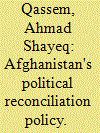

|
|
|
|
|
| Publication |
2014.
|
| Summary/Abstract |
The Afghan government's peace and reconciliation overtures to the militants, initially at the unofficial level but later sanctioned officially, have formed a key theme of state security policy from the early days of the post-Taliban administration in Afghanistan. Yet far from producing peace and stability, they seem to have played into the hands of the violent groups intent on overthrowing the country's internationally supported and legitimate political system in the past decade. There is no doubt about the importance of national reconciliation as a wider process of overcoming the legacy of beleaguered social relationships and forging a common vision for the future among all Afghans, but the nature of the government's reconciliation policy, which borders on appeasement of the militants, seems so far to have created more vulnerabilities than strengths in the face of increasingly emboldened anti-state violent groups.
|
|
|
|
|
|
|
|
|
|
|
|
|
|
|
|
| 2 |
ID:
108039
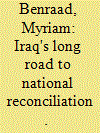

|
|
|
|
|
| Publication |
2011.
|
| Summary/Abstract |
As the US prepares to pull out of Iraq, the 'national reconciliation' process that was launched in the Summer of 2006 remains stalled. The March 2010 legislative elections, which were expected to consecrate the rebuilding of a national pact between Iraqis, have led to even greater fragmentation of Iraq's socio-political landscape. The power sharing agreement ultimately presages more tensions to come. With the essence and reality of the Iraqi 'nation' long debated and subjected to continued deconstruction under the combined effects of authoritarianism, military conflagrations and economic sanctions, it will likely take decades before a genuine reconciliation can come about.
|
|
|
|
|
|
|
|
|
|
|
|
|
|
|
|
| 3 |
ID:
174367
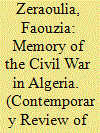

|
|
|
|
|
| Summary/Abstract |
The Algerian Civil War during the 1990s is considered to be one of the violent wars in the Arab world. For one decade, isolated from the international community, the country and its civilians suffered from extremism, radicalism, torture, and assassinations. Today, it is arguable that the memory of the Algerian Civil War played a pivotal role in producing the legitimacy of the political system and framing the citizens’ perceptions of the postwar regime before the current manifestations. Nevertheless, no field research has explored how that memory is represented and recalled by the people. Through analyzing the public narrative, surveying and examining the public platforms, and conversations dealing with the past civil war in Algeria, this article seeks to demonstrate how that violent past is remembered in the public arena, the emotions that have been accumulated from such experience and the lessons that have been learned by the people. In doing so, we use many examples from the Algerian manifestations after 22 February 2019, or what is called “the Algerian Hirak.”
|
|
|
|
|
|
|
|
|
|
|
|
|
|
|
|
| 4 |
ID:
090140
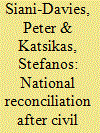

|
|
|
|
|
| Publication |
2009.
|
| Summary/Abstract |
This article discusses post-conflict reconciliation in Greece following the divisive civil war of the 1940s. Focusing on the elite political discourse and the relationship between reconciliation and democratization, its chief argument is that in Greece continuing disagreement about the civil war did not inhibit a process of reconciliation because it was voiced within a normative framework in which violence had been repudiated as a political tool. Particularly since the fall of the Colonels' dictatorship in 1974, reconciliation has been linked to a number of distinct political projects, some of which were as divisive as conciliatory in their effect. In each case, reconciliation meant different things to differing shades of political opinion, but the widespread adoption of the term by both the governing and opposition elites, as well as society as a whole, gradually entrapped politicians of all persuasions into accepting that a process of reconciliation had occurred. Reconciliation in Greece has therefore rested not on the establishment of a single agreed narrative representing the truth about the past, but rather on the righting of perceived injustices and the free articulation of differing interpretations of that past by both left and right within a democratic environment.
|
|
|
|
|
|
|
|
|
|
|
|
|
|
|
|
| 5 |
ID:
111600
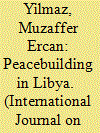

|
|
|
| 6 |
ID:
146307
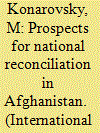

|
|
|
|
|
| Summary/Abstract |
THE TIME that has passed since most of the Western military contingent was withdrawn from Afghanistan has not led to the materialization of the weak hope for the government's ability to meet the formidable challenges involved in stabilizing the situation and peace-building in the country, including on the basis of dialogue with the armed opposition. Extreme instability will most likely predetermine the internal situation in Afghanistan also in the foreseeable future. After more than the decade-long active presence of foreign troops in Afghanistan, as well as massive external financial and economic infusions, the country continues to be associated with the concept of a "failed state," continuing to be affected by ethnic and religious fragmentation and medieval prejudices. The failure of Washington's mission in Afghanistan was evidenced by its inability to deliver a decisive blow either to al-Qaeda or the Taliban.
|
|
|
|
|
|
|
|
|
|
|
|
|
|
|
|
| 7 |
ID:
124149


|
|
|
|
|
| Publication |
2013.
|
| Summary/Abstract |
NATO troops are leaving Afghanistan in 2014, a quarter of a century after Soviet troops ended their occupation. How comparable are the two retreats, and will Afghans suffer fighting and destruction similar to what happened when foreign troops last left? Mikhail Gorbachev, who took the withdrawal decision in 1985, felt the war had become an expensive stalemate. The USSR opted to base its exit strategy on diplomacy and the idea that the Afghan government should pursue peace talks with its armed opponents. This emphasis on negotiations differs from Obama's policy, which remains predominantly military and rejects compromise with the Taliban. Obama and NATO claim progress on the battlefield and argue that combat duties can safely be "transitioned" to newly trained Afghans. But most Afghans are gloomy. Although they do not expect Kabul to fall to the Taliban, they believe that the insurgents will capture large parts of southern Afghanistan. Many also fear that ethnic tensions will grow throughout the country, perhaps leading to conflict between warlords from the Tajik and Uzbek minorities and the Pashtun majority.
|
|
|
|
|
|
|
|
|
|
|
|
|
|
|
|
|
|
|
|
|